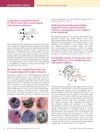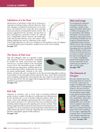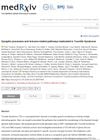 19 citations,
December 2015 in “European Journal of Human Genetics”
19 citations,
December 2015 in “European Journal of Human Genetics” A rare ITGB6 gene variant causes intellectual disability, hair loss, and dental issues.
 1 citations,
May 2023 in “Frontiers in endocrinology”
1 citations,
May 2023 in “Frontiers in endocrinology” A new MBTPS2 gene variant disrupts fat metabolism and collagen production, causing Osteogenesis imperfecta.
 January 2024 in “Genetics in Medicine Open”
January 2024 in “Genetics in Medicine Open” A new IL6ST gene variant may cause a unique form of hyper-IgE syndrome with skin abscesses and high IgE levels.
37 citations,
April 2018 in “Journal of Allergy and Clinical Immunology” A mutation in the IKZF1 gene causes immune system overactivity, linked to autoimmune diseases like lupus.
 January 2012 in “Journal of Investigative Dermatology”
January 2012 in “Journal of Investigative Dermatology” Some Greek melanoma patients have gene mutations linked to increased cancer risk, a new color feature helps diagnose melanoma, the incidence of a skin condition in the Netherlands is rare, and a gene possibly affects male-pattern baldness.
 39 citations,
January 2015 in “Annals of dermatology/Annals of Dermatology”
39 citations,
January 2015 in “Annals of dermatology/Annals of Dermatology” Three new types of a skin blistering disease were found, caused by specific gene mutations.
 May 2015 in “Journal of Investigative Dermatology”
May 2015 in “Journal of Investigative Dermatology” Melanoma risk tools need improvement, a gene mutation causes a hair disorder that might be treated by managing cell stress, a potential therapy for a skin-ear disorder involves blocking cell channels, skin wrinkling may indicate lung aging regardless of smoking, and oxidative stress might contribute to common baldness.
 April 2015 in “Experimental Dermatology”
April 2015 in “Experimental Dermatology” Melanoma risk tools need improvement, certain gene mutations cause skin diseases and could be treated by targeting those mutations, skin wrinkling may relate to lung aging due to genetic factors, and oxidative stress affects hair loss but can be reduced in low oxygen.
 2 citations,
January 2019 in “Medizinische Genetik”
2 citations,
January 2019 in “Medizinische Genetik” The document reports findings on genetic research, including ethical concerns about genome editing, improved diagnosis of mitochondrial mutations, solving inherited eye diseases, confirming gene roles in epilepsy, linking a gene to aneurysms, and identifying genes associated with age-related macular degeneration.
 25 citations,
March 2012 in “Journal of Dermatological Science”
25 citations,
March 2012 in “Journal of Dermatological Science” Genetic variants linked to ten skin diseases were found, showing both immune and non-immune factors play a role.
 29 citations,
November 2022 in “Nature Medicine”
29 citations,
November 2022 in “Nature Medicine” Genetic variations greatly affect individual metabolism and can impact health and disease risk.
 1 citations,
January 2021 in “Skin appendage disorders”
1 citations,
January 2021 in “Skin appendage disorders” Chemotherapy patients don't all lose their hair due to factors like hair growth rates, age, genetics, and the type of drugs used.
 103 citations,
October 2003 in “Birth Defects Research”
103 citations,
October 2003 in “Birth Defects Research” Both genes and environmental factors like chemicals may contribute to the increase in hypospadias, but the exact causes are still unclear.
 8 citations,
May 2022 in “Orphanet Journal of Rare Diseases”
8 citations,
May 2022 in “Orphanet Journal of Rare Diseases” The UD-PrOZA program successfully diagnosed 18% of adult patients with rare diseases, often using genetic testing.
 2 citations,
September 2020 in “Schweizer Archiv für Tierheilkunde”
2 citations,
September 2020 in “Schweizer Archiv für Tierheilkunde” Swiss Holstein cattle with curly, short hair carry genes from the Simmental breed.
 1 citations,
February 2009 in “Clinical Genetics”
1 citations,
February 2009 in “Clinical Genetics” New genes linked to male pattern baldness were found on chromosome 20p11.
 September 2022 in “bioRxiv (Cold Spring Harbor Laboratory)”
September 2022 in “bioRxiv (Cold Spring Harbor Laboratory)” The research provided new insights into the genetic factors contributing to hair loss and skin conditions by analyzing individual cells from the human scalp.
 30 citations,
June 2016 in “Journal of Human Genetics”
30 citations,
June 2016 in “Journal of Human Genetics” Researchers found genetic mutations causing hypohidrotic ectodermal dysplasia in 88% of studied patients and identified new mutations and genetic variations affecting the disease.
3 citations,
January 2013 in “Dermatology” New genetic mutations causing hair loss were found in a Chinese family.
 1 citations,
May 2023 in “Journal of neuroendocrinology”
1 citations,
May 2023 in “Journal of neuroendocrinology” DAVID syndrome is a condition with immune system and hormone deficiencies, needing early diagnosis to avoid serious complications.
 1 citations,
March 2022 in “bioRxiv (Cold Spring Harbor Laboratory)”
1 citations,
March 2022 in “bioRxiv (Cold Spring Harbor Laboratory)” Low-coverage sequencing is a cost-effective way to identify genes related to wool traits in rabbits.
 August 2023 in “Frontiers in Endocrinology”
August 2023 in “Frontiers in Endocrinology” Mutations in mitochondrial DNA might significantly contribute to the development of Polycystic Ovarian Syndrome.
 121 citations,
November 2020 in “Endocrine”
121 citations,
November 2020 in “Endocrine” Male hormones like testosterone may make COVID-19 worse, and testing for sensitivity to these hormones could help predict how severe a patient's symptoms might be. Treatments that reduce these hormones are being explored.
 October 2022 in “Gadua Journal of Pure and Allied Science”
October 2022 in “Gadua Journal of Pure and Allied Science” Terbinafine is the most effective treatment for tinea capitis, a scalp infection often confused with other conditions.
 January 2024 in “Genetics in Medicine Open”
January 2024 in “Genetics in Medicine Open” Adults with Tatton-Brown-Rahman syndrome may have serious heart problems and need lifelong heart monitoring.
 13 citations,
April 2018 in “Scientific Reports”
13 citations,
April 2018 in “Scientific Reports” The genes KRT25 and SP6 affect curly hair in horses, with KRT25 also causing hair loss. If both genes are mutated, the horse gets curly hair and hair loss. KRT25 can hide the effect of SP6.
3 citations,
August 2021 in “Clinical Case Reports” Genetic testing is crucial before giving azathioprine to avoid severe side effects.
 5 citations,
November 2022 in “Genetics selection evolution”
5 citations,
November 2022 in “Genetics selection evolution” Low-coverage sequencing is a cost-effective way to find genetic factors affecting rabbit wool traits.
 1 citations,
April 2020 in “medRxiv (Cold Spring Harbor Laboratory)”
1 citations,
April 2020 in “medRxiv (Cold Spring Harbor Laboratory)” The study found that Tourette Syndrome may be linked to certain immune system processes and synaptic signaling.
 May 2015 in “Journal of Dermatological Science”
May 2015 in “Journal of Dermatological Science” Researchers found a new area on chromosome 2 linked to a genetic hair loss condition.



























